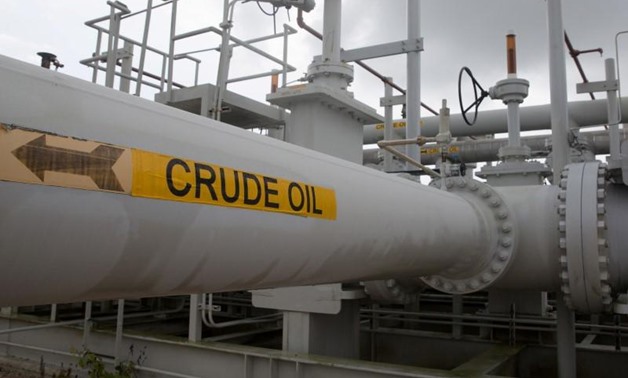
A maze of crude oil pipes and valves is pictured during a tour by the Department of Energy at the Strategic Petroleum Reserve in Freeport, Texas, U.S. June 9, 2016. REUTERS/Richard Carson
CAIRO - 20 January 2022: Minister of Petroleum and Mineral Resources, Tarek El Molla, signed two new agreements with the Canadian Transglobe and Pharos Energy companies to search for, develop and produce petroleum in several regions in the eastern and western deserts.
Total new investments amount to a minimum of $506 million, and a signature grant of $67 million to drill 12 wells, according to a statement by the Ministry of Petroleum issued Thursday.
The first agreement with the Canadian Transglobe Company includes the merger of the regions of North West Gharib, West Ghareb and West Bakr, in the Eastern Desert, and the injection of new investments for research, development and production of crude oil.
The second agreement with Pharos Energy aims to inject investments in research, development and production of crude oil in the Fayoum region in the Western Desert.
The signing of the two agreements comes as an extension of the agreements recently signed with the petroleum companies operating in Egypt, as part of the ministry’s continuous efforts to motivate companies to pump more investments and intensify activities to maximize production rates, especially with the current rise in international oil prices, according to El Molla.
From the two agreements, Egypt aims to increase crude oil production rates, in light of the agreement to pump more investments in a number of concession areas, and to use the latest technologies applied in the fields of research, drilling and production to increase reserves and oil production in those areas.
In December, the Ministry of Petroleum and Mineral Resources signed a new agreement with the American company Apache.
The agreement commits Apache to spend a minimum of $3.5 billion in research, exploration, development and production in the concession areas in the Western Desert of Egypt.
The signed agreement comes within the framework of the joint development and modernization efforts between the two sides by merging the concession areas of the two operating companies, Khalida and Qarun Petroleum, on behalf of the Petroleum Authority and the American Apache Company, which contributes to raising efficiency, optimal investment of capabilities, and achieving excellence in light of the current changes.
The agreement also opens the way for maximizing production rates of crude oil and natural gas, in light of the agreement to pump more investments in concession areas in the Western Desert and expand using the latest technologies applied in the fields of research, drilling and production.
A few days earlier, Egypt signed another agreement with the Italian company Eni, worth $1 billion.
The agreement commits Eni to spend at least $1 billion in investments, in addition to its commitment to spend at least an additional $20 million to drill 4 new wells.
The new areas in which Eni will be committed to searching for oil and gas are the areas of the Gulf of Suez and the Nile Delta.
On January 3, the Minister of Petroleum announced the awarding of 8 oil and natural gas exploration areas in the Mediterranean, Western Desert and the Gulf of Suez to companies (Eni, BP, Apex International, Energy Egypt, Ina Nafta, Sipetrol and United Energy).
The Egyptian General Petroleum Corporation and the Egyptian Natural Gas Holding Company have previously offered these areas to companies, through the Egypt Exploration and Production Gateway, with areas estimated at about 12.3 thousand km, with a minimum investment in research periods estimated at about $250 million, in order to drill a minimum of 33 wells, in addition to a $23.7 million signature grant.
Comments
Leave a Comment